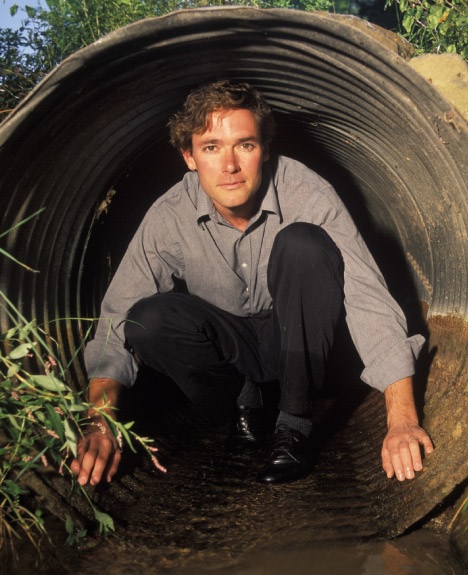Class Act: The Water Guy
When he was a senior in high school, Marc Edwards was sure he wanted to be a veterinarian. But after he spent a summer working with pets and getting bitten, he realized that “vets end up treating the owners more than the animals.” So he switched to civil engineering. Edwards is now a professor of civil and environmental engineering at Virginia Tech.
In 2004, homeowners in Washington, D.C., contacted him about leaks in their home plumbing. Working in part for the Environmental Protection Agency (EPA), Edwards set out to investigate. He found astronomically high levels of lead — which can cause birth defects and mental retardation — in a few samples of D.C.’s water. Later, the Washington Post exposed the widespread nature of the problem.
Edwards’ students eventually showed that the high lead came from chloramines, chemical disinfectants in the water, and that numerous children had been lead poisoned. At first, local and federal authorities assured residents that their water was safe. But Edwards persisted, testifying before Congress and calling out the Centers for Disease Control and Prevention for downplaying the problem. 
The experience taught him not only about fighting bureaucracy but also about the quality of today’s engineering students. “You often hear that North American students don’t have a work ethic, and they don’t know this and they don’t know that,” he says. “But I will tell you that it almost brings tears to my eyes to think about my students’ commitment and the hours they invested. It was remarkable.” Read ASEE’s 2007 article about Edwards HERE.
For the past several years, Edwards and his students have invested countless hours working with the residents of Flint, Michigan, to study and document perilous levels of lead in the drinking water. Their Flint Water Study website continues to inform and update the public.
His Flint investigation, which sparked Congressional hearings, resignations and firings of water officials in Flint and the U.S. Environmental Protection Agency’s regional office, and the discovery of high lead levels in drinking water throughout Michigan and in other states, earned Edwards a spot in ASEE Prism‘s March 2016 cover story highlighting “off-campus crusaders” who apply their engineering research to uncover and correct problems – even if they must take on the political or economic powers that be.
For his work, Edwards was awarded the 2018 Scientific Freedom and Responsibility Award from the American Association for the Advancement of Science.
Watch his 2017 Tedx Virginia Tech talk, Heroic by Nature, Cowardly by Convenience:
This article was updated from an August 2009 ASEE eGFI Students’ blog post by Alison Buki.
Filed under: Special Features
Tags: advocacy, ASEE Prism, civil and environmental engineering, Environmental science, Flint lead crisis, Marc Edwards, social justice, Virginia Tech, water quality








